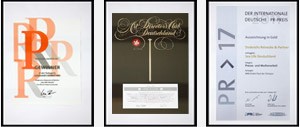Contact
DEDERICHS REINECKE & PARTNER
Public Relations Consultants
Schulterblatt 58
20357 Hamburg
Fon: +49 40 20 91 98 220
E-Mail: info@dr-p.de
PR-Agentur Hamburg
Imprint | Privacy policy
Awards

Granted – in terms of consistent sustainability we have so far been rather “always striving”. Sure, we have been separating waste and using green electricity for years, but there are also construction sites everywhere at DRP: From heating and ventilation to business trips and our own handling of waste and packaging.
But we have been tackling these issues properly for several weeks now. Our DRP sustainability officers Robert Bühlmeyer and Raphaela Künzle tell us exactly how:
What does an organization have to create in order to become sustainably green?
Robert: On the corporate side, the first thing to do is to make our colleagues aware that the need for change lies with all of us. Concretely: Everyone must realize that their commitment to green issues is recognized and that their ideas are really heard and ideally implemented quickly.
It should always be clear that the management is also serious: motivating colleagues to cycle while others are constantly flying from Hamburg to Cologne because it’s so fast is naturally unbelievable. So it only works if all levels of the hierarchy play along, and that works pretty well for us.
Raphaela: The many small steps of daily improvement are important. And that somebody actually wears the hat for something like that. With appropriate support from above and of course an appropriate budget.
But it’s just as important that the agency environment is sensitized: Service providers as well as clients.
How do you do that at DRP?
Raphaela: Robert and I are the Team Green at DRP and are regularly released from work. In order to make sure that the changes at DRP are really supported by all colleagues, we first asked anonymously what can be changed the fastest, for example what is most annoying in terms of waste of resources. And what concrete ideas are available.
But we also ask in our environment or at service providers: What is done there? What has already gone well?
This has led to very practical changes such as the purchase of reusable transport boxes for daily meals from your favourite lunchtime restaurant, sponsored agency bicycles, consistent use of rechargeable batteries instead of batteries or the installation of programmable thermostats so that the agency heating is automatically turned down at the weekend.
And: we now compensate consistently for necessary business trips with a corresponding CO2 tax.
What does this mean for the employees? And for the customers?
Robert: Sustainable action does not come for free. Basically, it is more complicated for our colleagues to have the soup filled into a box they have brought with them in the soup shop than to take the disposable bowl with them. Or to finish work three hours later because you went by train instead of taking the plane.
This can only be done with the right awareness and if really everyone participates. It is our job as Team Green to keep reminding them of this.
And that includes the bosses, service providers and even customers: For example, we expect sustainable action from our office cleaning services in the future. And customers will also have to pay a CO2 compensation for necessary flights and business trips and will recognize this item at the latest when they receive the invoice. We are clearly concerned here with communicating our attitude.
What are your goals? What have you already achieved?
Robert: Our overriding goal is to change consciousness here and to pass this on externally. We want to set a good example by making small changes every day. Internally we have already succeeded quite well.
It was important to us that we quickly become concrete and implement small feasible things immediately.
Raphaela: Big ideas are useless if they fail because of budget constraints or our own convenience. That’s why it was important for us to quickly deliver concrete and simple solutions instead of always just pointing out problems.
The process is never complete, but is constantly being expanded and questioned anew.
#greenagency #drpteamgreen